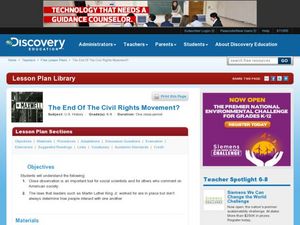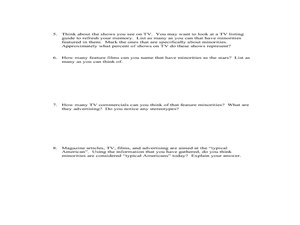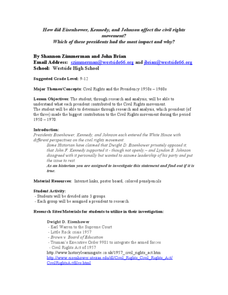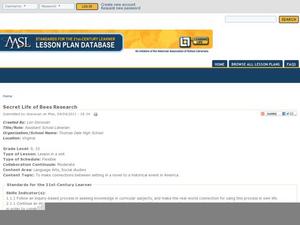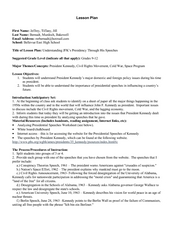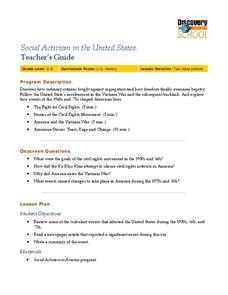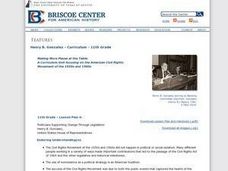Curated OER
The Civil Rights Movement
Students analyze the tensions that existed in American society during the Civil Rights Era as well as the problems that children experienced. They evaluate editorial cartoons dealing with the American Civil Rights movement to view the...
Curated OER
The End of the Civil Rights Movement
Middle schoolers examine the relationships between blacks and whites in their community. In this racial discrimination lesson, students make race relations observations within their community and then write letters that reveal their...
DocsTeach
To What Extent was Reconstruction a Revolution? (Part 2)
While Reconstruction laid the groundwork, many believe its revolutionary ideals weren't realized until the 1960s Civil Rights Movement. Using the 1965 Voting Rights Act, budding historians consider why it took more than 100 years to...
Stanford University
Lesson Plan: The Children's Crusade and the Role of Youth in the African American Freedom Struggle
Young people played significant roles in the Civil Rights movement. Class members examine the contributions of Barbara Johns, Claudette Colvin, Mary Louise Smith, and the children of Birmingham,...
Stanford University
Civil Rights Act of 1964
Was JFK a fallen Civil Rights hero—or a fraud? Learners examine Kennedy's own words and those of his critics to decide for themselves. After examining Kennedy's actions before his assassination, they determine what sort of legacy he left...
Curated OER
Minorities in Mainstream American Society
So many people fought for Civil Rights in the United States. Read about the Civil Rights Act of 1964, and discuss what the act guarantees. Then pass out a slew of magazines and encourage them to observe how often minorities appear in...
Curated OER
The Civil Rights Movement
Students explore the events of the Civil Rights Movement. In this research skills lesson plan, students research the important figures, events, and ideas of the American Civil Rights Movement as they visit suggested websites that feature...
Curated OER
Keep on Pushing: Popular Music and the Civil Rights Movement
High schoolers explore music that exemplified the Civil Rights Movement. In this music and history lesson plan, students research 1960's protest songs, Motown recorded music, and rap of the 1990's to consider the power of music and its...
Curated OER
How did Eisenhower, Kennedy, and Johnson affect the Civil Rights Movement?
Students research Eisenhower, Kennedy, and Johnson then utilize their findings to determine what each of the three Presidents contributed to the Civil Rights Movement. In this U.S. History lesson, students work in small groups to create...
Curated OER
Secret Life of Bees Research
The Secret Life of Bees provides high schoolers an opportunity to connect the events in the novel to events in America’s history. After choosing a topic from a provided list, individuals research how the event affected the Civil Rights...
National Endowment for the Humanities
"Sí, se puede!": Chávez, Huerta, and the UFW
"Sí, se puede!" Cesar Chavez and Dolores Huerta believed organizing farm workers and changing their working conditions were possible. Scholars examine provisions of the Bracero Program, videos, and the United Farm Workers' (UFW) work....
Curated OER
Understanding JFK's Presidency through his Speeches
Students reflect and discuss the major events that happened in the United States in the 1950's and 1960's. In this U.S. History lesson, students read and analyze the famous speeches during this time frame, then complete a worksheet that...
Curated OER
Education as a Civil Right
Students explore the implications of segregation. In this Civil Rights lesson, students investigate what equal education is as they discover the state of Boston schools in 1960. Students define civil rights and discrimination as they...
Albert Shanker Institute
The March on Washington Logistics Then and Now
I have a dream ... that all pupils will be able to organize a march of their own after learning about how Bayard Rustin organized the 1963 March on Washington for civil rights. Young reformers work collaboratively examining informational...
Curated OER
Social Activism in the United States
Seventh graders explore the goals of the Civil Rights Movement of the 1950s and 1960s. In this US History lesson plan, 7th graders read a newspaper article that reported a significant event during this era. Students write a summary of...
Curated OER
New Voices for African Americans
Eleventh graders study Malcolm X and black power. In this African American lesson, 11th graders write a journal entry about black power and create a timeline of the events during the civil right movement.
Curated OER
Nonviolence the Road to Freedom
Eleventh graders discuss the use of nonviolence. In this civil rights movement lesson, 11th graders write a journal entry on the differences between Rosa Parks and Martin Luther King Jr., discuss nonviolence and create a poster...
Curated OER
Making More Places at the Table: The American Civil Rights Movement of the 50's and 60's
Eleventh graders examine the biography of Henry B. Gonzalez. They examine primary source documents from Congressman Gonzalez's personal papers related to his contributions to the Civil Rights Movement.
Annenberg Foundation
Egalitarian America
What does a true American represent? Scholars investigate the equal rights era of the 1960s and 1970s in the 20th installment of a 22-part series on American history. Using photographic, magazine, written, and video evidence, groups...
National Woman's History Museum
Songs of Protest: Seneca Falls to Vietnam
Long before the songs of the 1960's Peace Movement, long before the songs of the Civil Rights Movement, and even before the songs of the Abolition Movement, were the songs of the Suffrage Movement. To understand the power of protest...
Literacy Design Collaborative
Exploring Character Development in The Watsons Go to Birmingham - 1963
How did the Civil Rights Movement affect young people in the United States? Scholars read Christopher Paul Curtis' novel, The Watsons go to Birmingham - 1963. Next, they write compare and contrast essays showing how the main characters...
Curated OER
The Student Non-Violent Coordinating Committee
Students identify and analyze the motivation behind the African-American students in organizing the sit-in if Greensboro and the formation of the SNCC. Students identify how the generational differences between members of SNCC and other...
Seattle Civil Rights and Labor History Project
Dr. Martin Luther King's Visit to Seattle
How was the work of Dr. Martin Luther King Jr. viewed by others during the 1960s? After watching an oral history video, your class members will learn more about Dr. King's ability to personally connect with others, as well as discover...
Defining US
Integration of Education and American Society
How did the struggle for Civil Rights during the 1950s transform American society and politics? Why are American schools integrated today? Class members explore these essential questions by examining a series of primary and secondary...



